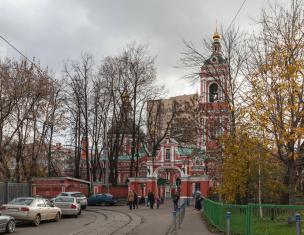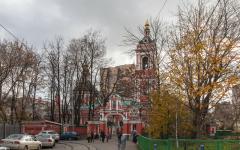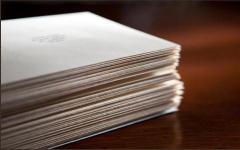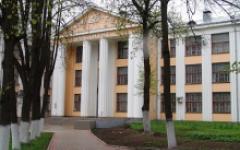The poem “To Rulers and Judges” was written by Derzhavin in 1870. Published in the St. Petersburg Bulletin. The poet achieved this publication with great difficulty. And yet the accusatory ode was published in a popular newspaper. It was a free translation of one of the biblical psalms of King David. Derzhavin, retaining the angry pathos of the original, added to it his purely “Russian” indignation at the “actions powerful of the world this."
Throughout the poem, people in positions of high power are accused. The author convinces the reader that only God can rule on Earth, and only he can be fair. According to Derzhavin, “power-hungers” are not able to understand the common man, much less help him. The poet bitterly “screams” about the injustice, meanness, indifference and greed of those who have reached power "earthly gods". Derzhavin's pain is heard in every word of the ode. Subject it is clear - to convince rulers to live according to the laws of humanity and virtue. Derzhavin also addresses "judges". He sees wisdom and justice in their faces. The author’s parallel dialogue reveals the essence of his verse - to promote “high judgement” and punish “arrogant” rulers with an “indignant” word.
At that time, the poem was more than bold. It was revolutionary, it called for the overthrow of arbitrariness and lawlessness. Collocation "punish the wicked"- This is a clear call for a political coup. Derzhavin believes that retribution will cover the insolent rulers. Catherine treated “Sovereigns and Judges” condescendingly. In the Russian state, she was known as the patroness of everything progressive and did not want to spoil relations with Derzhavin. That is why the poem has reached us without the intervention of censorship.
Content the poems can be described in the form of a short story, that is, moving away from the lyrics to the epic: “One day God looked around and saw a large crowd of people below. All of them were influential people in their state: they created laws, decided destinies... And the Almighty noticed that these people do not wield power fairly, not honestly, not humanely. God also saw what atrocities were happening around: a lot of poverty, hunger, death, humiliation... And God realized that the leaders of states were to blame for the misfortunes of ordinary people. And the angry Almighty appealed to the crowd from above to conscience. But the crowd did not hear the voice of the wise man from heaven. Disappointed in people, God disappeared, saddened... God’s sadness was picked up by a lonely and honest man. He began to brand “earthly” rulers with the power of his poetic word.”
“To rulers and judges” it is written iambic, using cross rhyme: judge-will(female), their-evil(male). Rhymes are basically words of one part of speech: innocent-powerless(adjectives), cover-shackles(nouns), they know, they are amazing(Verbs). But there are exceptions: the judge is me, listen to the earth.
IN epithets there is a truncation of the ending of the adjective: gods powerful, passionate, mortal. This gives the poem solemnity and strength. Historicisms: rivers, host, how long, pluck out, bribe, strip, villainy, ancient- emphasize both the longevity of events and the undying beauty of the passing word. Derzhavin's style is majestic and simple at the same time. There are seven exclamatory sentences in the ode! They are filled with enormous feelings of anger and contempt. Derzhavin's is good comparisons:
And you will fall like this,
like a withered leaf will fall from the tree!
And you will die like this,
how your last slave will die!
Adjectives faded, last show the fragility of dishonest rule.
The lyrical hero is full of bitterness, disappointment, powerlessness. And yet he believes that justice will prevail. Solemn song - ode- they call Derzhavin’s poem. An ode passionate, angry, accusatory, revolutionary.
The accusatory ode to “Rulers and Judges” is one of the most important works in Derzhavin’s work, which in an expressive and emotional manner draws public attention to the problem of corruption of officials. Can be used brief analysis“To Rulers and Judges” according to the plan for a literature lesson in the 9th grade and so that schoolchildren understand not only the meaning of the poem, but also the situation in Russia in the 18th century.
Brief Analysis
History of creation– Gabriel Romanovich wrote his work in 1870 and with great difficulty achieved its publication in the popular newspaper of that time – “St. Petersburg Bulletin”.
Composition– the poem is a complete story, not divided into specific parts, the theme develops sequentially.
Theme of the poem- the need to live according to the laws of universal human virtue, of which Derzhavin is trying to convince people in power.
Genre- an ode, but an angry and accusatory ode, for its time - almost revolutionary.
Poetic size– iambic using cross rhyme.
Epithets – “last slave”, “withered leaf”, “ earth gods” .
Comparisons – “like a withered leaf will fall from the tree”, “you will die like your last slave will die”.
History of creation
The poem is a sick translation of one of the psalms, which Derzhavin supplemented with his own indignation at those in power. It was written in 1870 and, after great effort on the part of the poet, it was finally published - in the newspaper “St. Petersburg Bulletin”.
Derzhavin was not only a poet, but also statesman, who held quite high positions for many years. And such activity showed him all the shortcomings of the management system in the Russian Empire - and there were many of them. Over the years of his service, Gabriel Romanovich became firmly established in the idea that the system needed fundamental changes - this idea was expressed by him in the poem “To Rulers and Judges.” Thus, the history of the creation of this ode is closely connected with the historical and political realities of his time.
Despite the fact that Derzhavin was a convinced monarchist, his ode was perceived by the courtiers and the empress herself, who generally favored the poet, as a revolutionary call. And, despite the fact that the poet did not put into his lines the idea of overthrowing the existing system, simply expressing accumulated bitterness about the reigning injustice, later the accusatory tendency he set was developed in the Russian literary tradition.
Subject
The theme of this incriminating work is the arbitrariness of officials and other statesmen who use their power to the detriment of both the people and the state. They are power-hungry, greedy, vile and unable to understand or help the common man. The poet addresses the rulers, urging them to live according to their conscience, and the judges (meaning specifically the empress), urging them to carry out a fair trial and punish the rulers who have become so arrogant. However, at the end the poet expresses the idea that only God can truly rule people fairly.
Composition
It corresponds to the composition of the original source, that is, the 81st Psalm of King David, of which it is a free translation.
Throughout the entire verse, the poet develops the same idea about the corruption of those in power and the need for change. So, at the beginning, he expresses his views on a fair social system, when those in power protect those who need it. He goes on to point out that nothing like that is actually happening, everyone is just looking out for their own interests.
And in the end, he, firstly, affirms the idea that such a violation of the laws of humanity cannot go unpunished, and secondly, he appeals to God as the highest authority.
Genre
It is not difficult to determine the genre of this work - it is an ode. But the ode is angry - that’s what the author himself called it. It also contains elements of a spiritual ode, since it is based on the biblical text. The ode is written in iambic and uses cross rhyme.
Expressive means
The artistic originality of Derzhavin’s work is expressed not only in the mixture of subgenres, but also in the means of expression he uses to convey his message. So, it contains the usual methods:
- Epithets- “the last slave”, “withered leaf”, “earthly gods”.
- Comparisons- “like a withered leaf will fall from the tree”, “you will die like your last slave will die.”
However, they act as aids. The main ones are Slavicisms, with the help of which the poet makes his poem more solemn, and rhetorical exclamations. They play a very important role in the fabric of the work, giving it a resemblance to oratory. In this way, Derzhavin attracts the attention of readers.
Poem test
Rating Analysis
average rating: 4.3. Total ratings received: 123.
G.R. Derzhavin. "To Rulers and Judges"
History of creation
From 1786 to 1788 Derzhavin served as governor of the Tambov province. As in other services, here he was active and tried to change a lot in the existing order of the region. But he soon realizes that local nobles are hindering his transformation, and the ideals of education, duty and justice arouse open hostility from officials. He sees how the law is violated in high government positions, and the violators do not receive any punishment. He tries to restore order, but does not find like-minded people. It was at this time, in 1787, that he wrote the civil ode “To Rulers and Judges.”
As the basis for this work, Derzhavin took a previously written poem on a biblical theme, which was called “Psalm 81.”
Psalm - This biblical song addressed to god. The author of such songs is considered to be the Old Testament King David.
Derzhavin translated the ancient work into modern language, filled it with accusatory content and gave the poem a new title: “To Rulers and Judges.”
Main themes and ideas of the poem
Based on the biblical text, the author talks about modern life Russian state. In his native country, laws are violated with impunity, the weak are oppressed, untruth and evil triumph, and there is nowhere to look for justice. We can only trust in God, only he can restore order in the country. And if the Lord asks the rulers how they carry out the laws established by them?
The Almighty God has risen and judges
Earthly gods in their host;
How long, river, how long will you be
Spare the unrighteous and evil?
Your duty is: to protect the laws,
Don't look at the faces of the strong,
No help, no defense
Do not leave orphans and widows.
Your duty: to save the innocent from harm,
Give cover to the unlucky;
To protect the powerless from the strong,
Free the poor from their shackles.
They won't listen! They see - but they don’t know!
Covered with bribes of tow:
Atrocities shake the earth,
Untruth shakes the skies.
The poet angrily denounces the “unrighteous and evil.” The author reminds them that people endowed with power still remain people, and not omnipotent gods. Therefore, they should remember the highest punishment, how easily they violated the law of justice established by God himself. This is the main idea of the poem.
And you will fall like this.
Like a withered leaf falling from the tree!
And you will die like this,
How your last slave will die!
Of course, this work was perceived as a revolutionary proclamation. Indeed, in the last quatrain the poet calls for justice against the unjust government.
Resurrect, God! God of the right!
And they heeded their prayer:
Come, judge, punish the evil ones
And be one king of the earth!
The artistic originality of the poem
On the one hand, this the work can be classified as a spiritual ode, because it is based on the biblical text. The vocabulary and images of the poem indeed resemble a psalm, for example, the following words are used: in a host; they don’t listen; covered with bribes of tow; listen to their prayer. Author includes rhetorical exclamations, questions, appeals:“How long will you have mercy on the unjust and evil?”; “Kings! I thought you gods were powerful..."; “Rise up God! Good God! Thanks to such techniques an oratorical sound is created that convinces readers that the poet is right.
On the other hand, this poem is aimed at awakening the reader’s consciousness, arousing a desire to correct vices, it is a kind of warning, instruction from the “rulers”.
What is the meaning of this ode? Of course, Derzhavin was not a revolutionary, he was a monarchist, and his poem did not intend to cause a rebellion in society. But the lack of justice in the country greatly outraged him. In the future, a similar theme will appear in the works of Pushkin, Lermontov and other poets.
Derzhavin in this ode acts as an innovator: he combines Old Slavonic vocabulary with commonly used words, speaks about power from the point of view of universal, moral ideals. The poet does not glorify the ruler, as should be the case in an ode to classicism, but exposes the vices of kings and nobles.
“To Rulers and Judges” by G.R. Derzhavin
History of creation. Derzhavin's unusually courageous, decisive and independent character was evident in everything, including in his poetic work. One of his poems almost caused expulsion and disgrace. It was an ode to “Lords and Judges,” written in 1787, which the author called an “angry ode.”
Service in high government positions, including work as a governor, convinced Derzhavin that laws were constantly being broken in the Russian Empire. His fight against this phenomenon as a high-ranking civil servant was unsuccessful: he did not find support either in society or in the government. Lawbreakers successfully avoided deserved punishment. But at the same time, the poet firmly believed that Catherine herself was a virtuous monarch, surrounded by evil dignitaries. Indignation and anger needed an outlet. And then the poet decided to write an arrangement of Psalm 81—that’s what biblical hymns addressed to God were called in ancient times. Their author is the Old Testament king David, whose writings make up one of the most poetic books of the Old Testament - the Psalter.
The theme of this psalm turned out to be in tune with the spirit of the times. It is no coincidence that this 81st psalm was paraphrased by the Jacobins during the French Revolution in Paris, and the people sang it in the streets of the city, expressing indignation at King Louis XVI, who was subsequently executed.
Derzhavin made the first version of his transcription of Psalm 81 several years before its publication. He gave the poem to the St. Petersburg Bulletin. But the publishers, being frightened, cut it out of the already printed book of the magazine. In the new version, written five years later, the poet even strengthened the accusatory pathos of the poem. He managed to achieve its publication. Moreover, he removed the previous title - “Psalm 81” - and published work under its title “To Rulers and Judges”.
Main themes and ideas. The content of Derzhavin’s ode, based on a biblical text, is connected with the poet’s contemporary life in the Russian state. It is here that he sees the violation of justice, the violation of laws, the oppression of the weak, the triumph of untruth and evil, the analogy of which he finds in the Old Testament history:
How long, rivers, how long will you be
Spare the unrighteous and evil?
The need to subordinate everyone to the single law of supreme truth and justice is affirmed by Derzhavin in this poem, as in many others;
Your duty is: to protect the laws,
Don't look at the faces of the strong,
Do not leave orphans and widows without help, without defense.
Your duty: to save the innocent from harm, to provide cover to the unfortunate;
To protect the powerless from the strong,
Free the poor from their shackles.
But in real life he sees the evasion of this supreme law by those in power, who must first of all monitor compliance with the laws:
They won't listen! They see - but they don’t know!
Covered with bribes of tow:
Atrocities shake the earth,
Untruth shakes the skies.
That is why the voice of the poet-accuser of the “unrighteous and evil” sounds so angry. He asserts the inevitability of punishment for those “evil” rulers who do not obey the highest law of truth and justice - this is the main idea and main idea of Derzhavin’s ode:
And you will fall like this.
Like a withered leaf falling from the tree!
And you will die like this,
How your last slave will die!
It is not surprising that the ode to “Rulers and Judges” was perceived not only by the court circle, but even by the empress, who was usually favorable to Derzhavin, as a revolutionary proclamation. After all, it talks about the fact that unrighteous power cannot be durable; it will inevitably face the wrath of God and fall. The poet seeks to warn the empress about this, in whose virtue he continued to believe. Otherwise, such “rulers and judges,” as the author states in the final quatrain of the ode, will inevitably be replaced by those who will be guided by the ideals of goodness and justice:
Resurrect, God! God of the right!
And they heeded their prayer:
Come, judge, punish the evil ones
And be one king of the earth!
Artistic originality. An innovative poet, Derzhavin boldly goes to destroy the norms of classicism that were already familiar to his time and creates his own special poetic system. At the end of his life, Derzhavin, summing up the results of his work, writes “Explanations on Derzhavin’s works,” containing a kind of auto-commentary to the works, and finishes the work “ Discussions about lyric poetry, or about odes,” where he sets out his theory of literature and the history of world lyric poetry, explains his creative method and style. It is here that he speaks in detail about those genre varieties of ode that appear in his work starting with “Felitsa”. If the poet classifies this work as a mixed ode, the author calls the poem “To Rulers and Judges” an angry ode. If we follow tradition, then it would have to be attributed to the genre of spiritual ode, which was well developed by that time in Russian literature - after all, it is based on the biblical text. Moreover, in Derzhavin’s ode the vocabulary and many images really remind us of biblical poetry: in a host of them; covered with bribes of tow; listen to their prayers, etc. The solemn style of the ode is created not only due to the abundance of Slavicisms, but also with the help of special syntactic means: rhetorical exclamations, questions, appeals: “how long will you spare the unrighteous and evil?”; “Kings! I thought you gods were powerful..."; “Rise up God! Good God! In addition, the poet uses the technique of anaphora and syntactic repetitions: “Your duty is: to preserve the laws...”, “Your duty: to save the innocent from harm...”; “They don’t listen! They see and don’t know!”
All this gives the poem an oratorical sound, which helps the author to maximize the attention of readers and listeners. After all, of course, what we have before us is not so much a spiritual ode as, using the author’s definition, an “angry” ode, that is, one that is designed to express the bitterness of the author, who sees the depravity of his contemporary life, and to reflect the accusatory pathos of the poem, which should awaken in readers not only anger, but also the desire for cleansing and correction of vices.
The meaning of the work.
We know that Derzhavin himself did not put a revolutionary meaning into his work; he was a monarchist in his political convictions, but such a vividly and emotionally expressed protest against the “unjust and evil” began to be perceived by many as a political proclamation. The author of “Felitsa,” praising the “virtues” of the empress and sincerely believing in her wisdom and justice, in the ode “To Rulers and Judges” appeared in a completely new guise: he became an angry denouncer of the vices of rulers who trampled on law and morality, and thereby opened literature one of its most important trends. Subsequently, it received brilliant development in the works of Pushkin, Lermontov and many other remarkable Russian writers of subsequent decades. But for the contemporary reader, this work may also turn out to be close and understandable: after all, the vices of the unjust government, its desire to act in its own, and not the public, state interests, trampling laws and justice, unfortunately, remain relevant today.
Righteous anger is destructive in nature. After all, he carries within himself the wind of justice. And if he is also supported by the mystical power of poetry, nothing can stop his impulse. Gabriel Derzhavin’s poem “To Rulers and Judges” shows the reader an example of just such righteous anger.
The fact is that the verse was written at a time when the author worked in the province as a military official. He saw there how much high society does not care about ordinary people who hold the country on their strong shoulders. Derzhavin tried to somehow rectify the situation, he complained to the highest ranks of the state about the lawlessness, but heard only ridicule in response. Anger needs to be thrown out somewhere, and the poet found a way out in poetry.
The work begins with an almost biblical appeal to the earthly rulers of destinies, the powerful of this world. But Derzhavin in the very first line goes to the level, he calls them “earthly gods” to designate all the power over the ordinary Russian person that is available to them. Important point is that from the writer’s biography we know that he considered the royal family a model of morality and righteousness, and all the troubles in Russia were due to their environment, which constantly brought lies to their ears. That is why he wonders how long the “earthly gods” will spare evil.
In general, the entire first part of the poem is programmatic; the author lists the responsibilities that the supreme power bears. It is about helping the poor, the weak and the innocent. It would seem an obvious thing, but those to whom Derzhavin addresses do not see it. The main idea is endlessly simple: power is always accompanied by enormous responsibility.
“Kings! I thought you gods were powerful.”
Here he will express a thought to which, obviously, he was very keen. for a long time. Despite all the power they possess, even if the whole world is in their hands, they are also people. They are made of blood and flesh. Kings will also stand before God in judgment, and they will be judged according to the same laws as village men or city harlots. And only the Almighty knows who will receive greater leniency from Him. He sums this up with a very powerful line:
"And you will die like this
How your last slave will die!
Sooner or later, earthly life will end and you will have to answer for your sins, your power and its use.
At the end of the poem, the desperate Derzhavin turns to God himself:
“Rise up, God! God of the right!
He comes to the conclusion that normal life will never come in this sinful world until Jesus himself rises again, replaces and unites all the thrones of the world under the single authority of the Kingdom of God. This idea shows how inherently tragic this verse is. It reflects the entire spirit of the times, a troubled age, dark and difficult, where no one sees a way out of the darkness.








